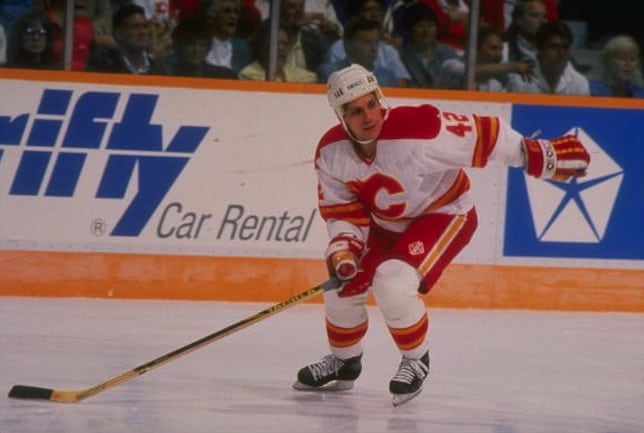
Backchecking: Russian star Sergei Makarov speaks (very) softly but carried a huge stick
Sergei Makarov played only six seasons in the NHL, but he was an incredible offensive force from the moment he stepped into the league. In his rookie season, at age 31, he scored 24 goals and 86 points en route to the Calder Trophy and is the oldest player to ever capture the award. His win forever changed the rules about Calder eligibility.
 Backchecking: Russian star Sergei Makarov speaks (very) softly but carried a huge stick
Backchecking: Russian star Sergei Makarov speaks (very) softly but carried a huge stickBy Denis Gibbons Terry Crisp bent over backwards to show Sergei Makarov respect when the great Soviet winger came to play in the NHL for Calgary in 1989. One day the Flames coach was drawing up a play on the board, illustrating to Makarov how to position himself. Suddenly, Makarov grabbed the chalk, crossed everything out and started making his own diagrams. “Tikhonov bad guy, good coach,” he said to Crisp (in reference to the late Soviet bench boss). “You? Good guy, bad coach.” Crisp, who had led the Flames to a Stanley Cup the year before, said Makarov, who played in the Soviet Union on the KLM line with Vladimir Krutov and Igor Larionov, probably had more talent than anybody he had ever coached.
“But I’d played for Scotty Bowman and Fred Shero, two of the best coaches in the business,” he said. ”It wasn’t as if I just fell off a turnip truck.”

The Flames signed Makarov to take the spot of Hakan Loob, who returned to Sweden after the Cup win. Loob had scored 50 goals in 1987-88. Makarov had legs like tree trunks and a bow-legged style of skating which made him almost impossible to knock off the puck. One of his favorite moves was dropping the puck between his legs to his skates then kicking it back up to his stick at the same time as he was speeding around a defenseman.
He played four seasons in Calgary, then two in San Jose, where he was instrumental in getting the Sharks to within a game of the Western Conference final in 1993-94. Few players know him better than Larionov. “Sergei was a quiet guy, who was very modest and didn’t like to be in the spotlight,” Larionov said. “When Kevin Constantine took over as coach in San Jose, the team had lost 71 games the season before, he introduced a system of defensive hockey and Sergei, who was 36 at that time, wasn’t happy about it.” When he was 38, Makarov signed with Dallas after being released by the Sharks. A few years ago, he told the Russian newspaper Sport Express how amused he was when Stars coach Ken Hitchcock started drawing him diagrams showing him how to go around players and where to be open on the ice. Makarov said when younger players on Dallas started paying attention to him, rather than Hitchcock, the coach complained to GM Bob Gainey and eventually his contract was terminated. Makarov, who doesn’t often talk to the media, granted me an interview at the 2012 KHL All-Star Game in Riga, Latvia, but only after plenty of persuasion. When I asked for his phone number, hoping to continue our chat later, he refused. He also did not return a message requesting an interview for this story. Of all the players looking into the Hall of Fame from the outside, none gets as little attention as Makarov, who is now 56. He was inducted into the IIHF Hall of Fame in 2001. Makarov’s career stats are remarkable. A two-time gold Olympic medalist, he also earned eight world titles and two WJC gold and was a key member of the Soviet Union’s victorious team in the 1981 Canada Cup. He led the Soviet Elite League in scoring a record nine times. Makarov played 424 NHL games for Calgary, San Jose and Dallas, scoring 134 goals and 384 points. He won the Calder Trophy as rookie of the year in 1990, though he was 31 at the time. As a result, the rules were changed, and now only players under 26 qualify. After retiring as a player, Makarov worked for Slava Fetisov, who was Russia’s Minister of Sport from 2002 to 2008. He also was vice-president of the CSKA Moscow, the old Red Army hockey club, for a year. In 2005, with the support of Fetisov, he was a candidate for president of the Russian Ice Hockey Federation, but eventually withdrew, citing a lack of equal opportunities for those running. Alexander Steblin, a former KGB member, was re-elected. He now is director-general of Russia’s new Night Hockey League. It’s a recreational league for people who work all day but love the game so much they’re even willing to play at midnight. Coincidentally, the abbreviation for the league is NHL. In 2014, he was named vice-president of Traktor Chelyabinsk, the club with which he launched his hockey career but has since resigned. He now lives in Moscow.
This feature appears in the Feb. 16 edition of The Hockey News magazine. Get in-depth features like this one, and much more, by subscribing now.





